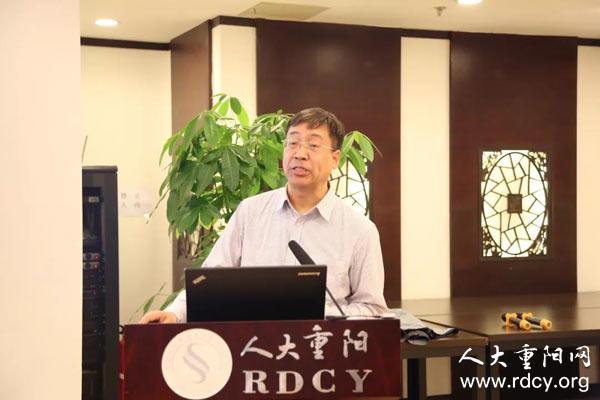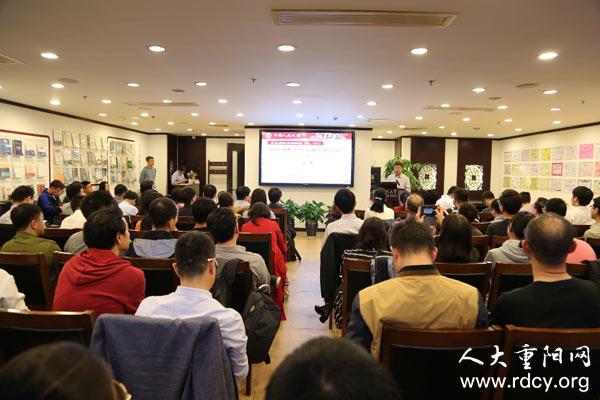Picture
Your Present Location: HOME> PictureZhang Jie: Chinese economy is no paradox as claimed by westerners
Editor's note: Finance holds the key role to a stable economy with dynamism. How can we view changes in China’s financial system and structure? What are features of the path that China supports its real economy through financial means as well as areas where we fall short? How can we understand progress of China’s finance? Let’s follow analysis of professor Zhang Jie who assumes in the School of Finance at Renmin University of China, to discuss that from the perspective of interior financial market.

Given economic boom and social progress, Chinese can raise their tones in the international stage and play a proactive role in the global community. Since the implementation of reform and opening-up policy of more than four decades, China has undergone unprecedented changes. However, there is an existing question worrying us that global scholars still concern China’s economic system and even regard it as a paradox. They owe tremendous progress that China has scored to abnormal phenomenon.
From the viewpoint of mainstream economics, China has become very rich and powerful. But where does such power come from? We fail to find a reasonable explanation to that. Allen Gale, the famous American economist, once wrote a book named as Comparing Financial System, which reveals that China’s financial system in fact is a failure. However, such failure contributes to a rising economic powerhouse. It is unbelievable to witness the fact that China has enjoyed its economic boom, which means a paradox to western economists. In other words, their so-called authority is being shaken and challenged.
Many reasons abound for China’s success. One factor lies in the emerging system of Chinese banks. It is a milestone of the times. Chinese banks that differ from western counterparts contribute to China’s development greatly. Westerners think China’s achievement defies consistency and normal rules. Even some domestic scholars and economists also bend their knees to such ridiculous view.
We have witnessed progress of China since the beginning of reform and opening-up and experienced a period of high-rate growth. Despite lower economic growth at present, I think it is fair to maintain economic development within a proper range instead of blindly pursuing a high growth rate because such practice defies economic rules.
First, two different kinds of financial market
The financial market is divided into two categories including external financial market and internal financial market. Europe is dominated by external financial market, and internal financial market prevails in China.
One reason for their difference is that the industrialization of Western Europe is based on the city, because in the era of frequent wars, the city is more secure than the countryside and the security also includes the financial security. In this case, many financial resources flood into the city, making the capital supply of the city more adequate. When capital is plentiful, prices (interest rates) will naturally fall. Based on this situation, the interest rate will also follow the increase of the average credit of the enterprise and show a downward trend.
It must be noted that there have been two credit systems in China since ancient times, and they have been gradually formed and continued over the past 5,000 years. The first is the national credit system, which is based on the unified system. Second, the small credit system - family credit system, bred by blood connection. Both credit systems are extremely important and indispensable to China's economic growth and social stability.
Now, China's long-term economic growth since the reform and opening 40 years ago is obviously dependent on this credit system. Both credit systems are extremely important and indispensable to China's economic growth and social stability.
In the Chinese history scanning over five thousand years, a very striking scene comes into our eyes is that, based on the national credit system, huge public infrastructure has been invested and built in different historical periods. Investment is based on national credit, including river and lake management, irrigation project, post road, defense project, etc. China is a country that advocates low tax rate in history. In the early days, the tax was very low. The answer to the low tax is to keep national credit system fully mobilize much human, material and financial resources as can as possible.
Why does the very large size of states logically create large internal financial markets? In short, In Europe where high frequency of wars occurs, countries have less room to maneuver. China is a vast country with vast resources and huge regional differences.
Small internal financial markets can be affected by regional geography and cultural traditions. There is a time-honored tradition in Chinese history that different places are governed by local customs. In the early period of the Western Zhou Dynasty, Laozi’s Tao Te Ching put forward the idea of "governing by doing nothing", which is a precious institutional legacy accumulated over thousands of years in China.
It seems that the economic process will bear risk without the constraints of the underlying credit. For thousands of years, the Chinese people have been pursuing the ideal of prosperous times, which is to explore the system balance between the state, the local government and the people. Only when the system is balanced can the people live a stable and happy life. From another perspective, the ideal of institutional equilibrium is the combination or balance of large internal financial market between small one.
Second, the root of financial dilemma in the course of reform
In recent decades, China has seen a long-standing so-called "grassroot-level financial escape" phenomenon, which is not like the present popular financial exclusion. The reason why China has had financial flight for a long time is that the underlying credit base is fragile and cannot produce a financial system that can truly meet its financial needs.
Rural society and small and micro enterprises have gradually lost the support of small internal financial market. This kind of thing has been happening for a long time, and now that the economic growth rate is declining, the financial difficulties of small and micro businesses and the private sector have become more and more important and severe.
Third, grassroot-level credit base and reconstruction of interior financial market of both big and small sizes
As for the underlying credit base, it is directly related to the reconstruction of the small internal financial market and the solution to the financial dilemma between small and micro enterprises and the private sector. In order to ease the financial difficulties of small and micro businesses, we need to take a long-term view. We should proceed at a leisurely pace.
As the crux of the problem lies in the underlying credit base, the reconstruction of the underlying credit base cannot be achieved overnight. It should be emphasized that the large internal financial market has played an important role in China's reform process and is a key supporting factor for China's long-term high economic growth. I maintain my view that the state-owned commercial banking system has been successful, at least in terms of providing financial support for the economic reform and development process.
In the process of economic reform, China has established a state-owned commercial banking system that is quite different from the European and American commercial banking systems, which is undoubtedly a great invention of the financial system. However, for a long time, this great financial system creation has been criticized and talked down by many people at home and abroad. People tend to imitate the commercial banking system in Europe and America at the beginning.
It can be predicted that the "Chinese way" of finding solutions to the financial difficulties of small and micro enterprises will surely give birth to another great financial system invention in the history of modern finance except the state-owned commercial banking system. Although the small and micro financial dilemma is considered a global problem, all kinds of solutions have been tried and proved invalid. Overall, the truth always draws few people’s attention. So why not resort to the Chinese solution?

Conclusion, study on China’s problems demands sensitive and consistent attitude
In recent years, due to some unknown reasons, some Chinese scholars have gradually developed an academic habit of seeking the theoretical possibility and abandoning the realistic consideration. It is time for us to know a country's economic success often lies in the details of its economic structure and life.
At first, many people mistakenly believe that the academic gap between Chinese economics and Europe and America rests on backward tools. However, it takes a long time to realize that the real gap lies in cultural cultivation.
China's economics is already too constrained by mathematical models and in urgent need of humanistic nourishment of classical works. Balzac once said, “the novel is the secreted history of a nation”. Obviously, I have added an extra task to my future study and research career: return to the history of Chinese literature and study the monetary and financial issues of China. In short, many paradoxes persisting in China's economy viewed from a mainstream perspective need to be addressed from the point of China's specific institutions.























































































 京公网安备 11010802037854号
京公网安备 11010802037854号





